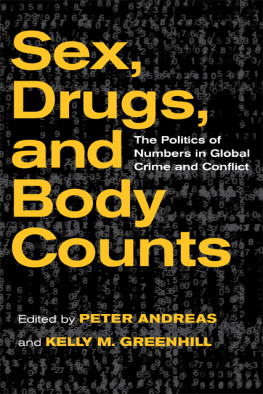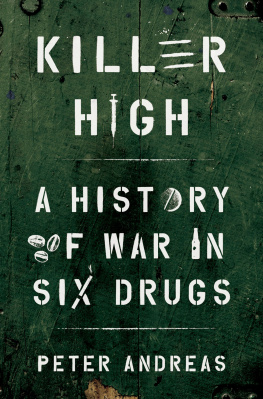This book is the product of a multi-year collaboration involving authors who cross disciplinary boundaries as well as the boundaries between academia and the policy world. The contributors include political scientists, anthropologists, sociologists, policy analysts, and practitioners. Despite widely varying backgrounds, training, and professional experience, all share a core interest in the politics of numbers and the use of numbers in politics.
We thank the World Peace Foundation and the Belfer Center at the Kennedy School of Government at Harvard University (and especially Robert Rotberg) for funding and hosting the conference in December 2006 that inspired the idea for this volume. We also thank the Watson Institute for International Studies at Brown University (the Global Security Program, the Politics, Culture and Identity Program, and especially Thomas Biersteker) for funding and hosting the December 2007 authors conference where early drafts of many of the chapters were first presented. Some of the draft chapters were subsequently presented on a panel at the 2008 Annual Convention of the International Studies Association in Chicago. We are grateful to Roger Haydon at Cornell University Press, who was sufficiently intrigued by the topic of this book to overcome his initial allergic reaction to taking on another edited volume. Two external reviewers for the press provided thoughtful and constructive comments. We also thank Solomon Eppel for his research assistance and Elizabeth Bennett for her help in getting this book ready for publication.
Finally, we would like to thank our co-authors without whose contributions this volume would have remained little more than an inchoate set of ideas and concerns that we shared and believed warranted greater attention, both by the academy and in the policy world. We believe that taken together the chapters herein represent far more than the sum of their parts, and we appreciate the substantial effort each of the contributors devoted to producing this volume.
Peter Andreas and Kelly M. Greenhill
1
Introduction
the politics of numbers

Peter Andreas and Kelly M. Greenhill
Not everything that counts can be counted, and not everything that can be counted counts.
Albert Einstein
We live in a hyper-numeric world preoccupied with quantification. In practical political terms, if something is not measured it does not exist, if it is not counted it does not count. If there are no data, an issue or problem will not be recognized, defined, prioritized, put on the agenda, and debated. Therefore, to measure somethingor at least claim to do sois to announce its existence and signal its importance and policy relevance. As Deborah Stone observes, Measures imply a need for action, because we do not measure things except when we want to change them or change our behavior in response to them. How exactly we go about measuring things and what we decide to measure are similarly important.
The political use of numbers is readily apparent across a broad range of domestic and international policy issue areas.
The creation, selection, promotion, and proliferation of numbers are thus the stuff of politics. Because quantification is politically consequential, it can also be highly contentious. Both proponents and opponents of any given policy will marshal reams of data to bolster their position and to weaken support for rival positions. For instance, if those formulating the numbers think the issue at hand is a big problem they want a big number, and if they want to minimize it, they want a small number.
Statisticsboth good and badare often uncritically accepted and reproduced because they are assumed to have been generated by experts who possess specialized knowledge and who know what they are doing. As one journalistin defending the controversial 2006 study, published in the Lancet, that suggested that well over 600,000 Iraqis had died as a direct result of the U.S.-led invasionput it: This was, after all, not a group of high school students handing out questionnaires at a Baghdad bazaar. These are scientists from a respected public health schoolJohns Hopkinsconducting a study funded by another respected schoolMIT.
Moreover, once produced, numbers are not dependent on their creators to be perpetuated and legitimated. The public announcement of an impressively large sounding number, regardless of its origins or validity, can generate prominent press coverage, which in turn legitimates and perpetuates the use of the number. As George Orwell once quipped: I heard it on the BBC is almost the equivalent of saying I know it to be true.
Yet, given the chronic and pervasive nature of political use and abuse of numbers, it behooves consumers of numbers to assess them with a critical eye and ask hard questions about their origins, even if doing so requires consumers to step outside their numeracy comfort zones. It likewise behooves producers of numbers to think harder about their sources of data, the conclusions they draw from these data, and the assumptions on which they are predicated. At a minimum, as Sarah Sewall, former director of Harvard Universitys Carr Center for Human Rights put it: greater and more systematic interrogation of politically relevant statistics could introduce some accuracy and some temperance to the [most] far-flung allegations, both from the left and the right.
The Politics of Numbers in Global Crime and Conflict
Some of the most heated and high profile political battles are over phenomena that are exceptionally difficult to measure and quantify, whatever the bona fides of those doing the measuring. One such realm is that of armed conflict, where competing estimates of combatant and noncombatant death tolls, war-related atrocities and the size of refugee and internally displaced populations can bring parties to blows, as well as imperil the governments deemed responsible for them. In the context of ongoing struggles not only on the battlefield, but also for influence over the hearts and minds of friends, foes, and fence-sitters alike, the incentives to politicize, and to systematically inflate or deflate, what data does exist are myriad. In the case of war-related refugee flows, for example, governments that find themselves hosting refugees may face powerful incentives to inflate or deflate the numbers of displaced in order to attract international aid or, conversely, to forestall potential anxiety within their own populations.
Contemporary armed conflicts by their very nature often occur in dangerous and difficult to access terrain, among hostile parties, making acquisition of accurate conflict-related statistics especially arduous. Consider, for example, the fact that most of the coverage of the 1994 Rwandan genocide focused on the humanitarian disaster that beset those Hutu who fled to Zaire in its aftermath rather than on the horror show that was the bloodbath itself. Consequently, estimates of the total number killed during the genocide still vary by as much as half a million people, from under 500,000 to well over one million. Among other problems, hospital and morgue reporting systems are often disrupted, while separating combatants from noncombatants can be problematic even under the best of conditions.















